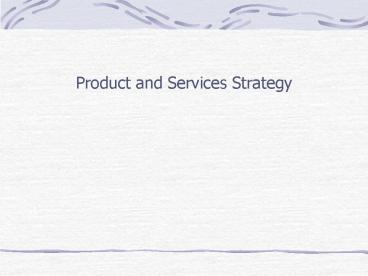Product and Services Strategy PowerPoint PPT Presentation
1 / 19
Title: Product and Services Strategy
1
Product and Services Strategy
2
What is a Product?
- A Product is anything that can be offered to a
market for attention, acquisition, use, or
consumption and that might satisfy a want or
need. - Includes
- Physical Objects
- Services
- Events
- Persons
- Places
- Organizations
- Ideas
- Combinations of the above
3
Levels of Product
4
Products, Services, and Experiences
Service With Accompanying Minor Goods
Tangible Good With Accompanying Services
Pure Tangible Good
Pure Service
Hybrid Offer
Auto With Accompanying Repair Services
Airline Trip With Accompanying Snacks
Soap
Restaurant
Doctors Exam
The Product-Service Continuum
5
Nature and Characteristic of a Service
Intangibility
Inseparability
Cant be seen, tasted, felt, heard, or smelled
before purchase. Cant be separated from service
providers. Quality depends on who provides
them and when, where and how. Cant be stored
for later sale or use.
Variability
Perishability
6
Product ClassificationsConsumer Products
7
Individual Product Decisions
Product Attributes
Branding
Labeling
Packaging
Product Support Services
8
Product Attributes
Developing a Product or Service Involves Defining
the Benefits that it Will Offer Such as
9
Branding
Consistency
Quality Value
Attributes
Identification
Advantages of Brand Names Brand Equity
High Brand Loyalty
Strong Brand Association
Perceived Quality
Name Awareness
10
Major Branding Decisions
Brand Name Selection Selection Protection
Brand Sponsor Manufacturers Brand Private
Brand Licensed Brand Co-branding
Brand Strategy Line Extensions Brand
Extensions Multibrands New Brands
11
Four Brand Strategies
12
Brand Strategy
- Line Extension
- Existing brand names extended to new forms,
sizes, and flavors of an existing product
category. - Brand Extension
- Existing brand names extended to new or modified
product categories. - Multibrands
- New brand names introduced in the same product
category. - New Brands
- New brand names in new product categories.
13
Major Stages in New-Product Development
14
Product Life Cycle
Sales and Profits Over the Products Life From
Inception to Demise
15
Applications of the Product Life Cycle
- The PLC concept can describe a
- Product class which has the longest life cycles
(i.e. gas-powered cars), - Product form which tend to have the standard PLC
shape (i.e. minivans), - Brand which can change quickly because of
changing competitive attaches and responses (i.e.
Ford Taurus), - Style which is a basic and distinctive mode of
expression, - Fashion which is a popular style in a given
field, - Fad which is a fashion that enters quickly, is
adopted quickly and declines fast.
16
Introduction Stage of the PLC
Summary of Characteristics, Objectives,
Strategies
17
Growth Stage of the PLC
Summary of Characteristics, Objectives,
Strategies
18
Maturity Stage of the PLC
Summary of Characteristics, Objectives,
Strategies
Sales
Peak sales
Costs
Low cost per customer
Profits
High profits, then lower profits
Maximize profits while defending market share
Marketing Objectives
Product
Diversify brand and models
Price
Price to match or best competitors
Distribution
Build more intensive distribution
Advertising
Stress brand differences and benefits
19
Decline Stage of the PLC
Summary of Characteristics, Objectives,
Strategies

